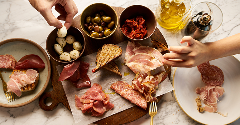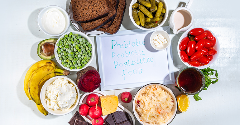News
Familiarity over foodtech: Is this the end of disruptive product development?
14 Aug 2023
Consumers are opting for traditional product purchases over disruptive, novel launches amid growing inflation, according to a Rabobank report.
Multinational banking and financial services company Rabobank’s report, “‘Disruptive’ Food Products Prove To Be More Hype Than Bite: Is the Age of Food Disruption Over?” details how current trends signal a halt on disruptive food launches amid the cost-of-living crisis, with consumers instead settling for traditional and necessary.

The report, written by the company’s senior consumer foods analyst Tom Bailey, states that many leading trends anticipated to experience exciting and growing prominence in the global food market have stalled due to rising inflation pressures.
A dampener on disruption
The move from disruptive to daily essentials signals a change for food manufacturers, as for the past decade, the consumer food industry has witnessed an explosion of disruptive product development.
Food categories, including plant-based meats, insect protein bars, synthetic fat replacers, and precision fermented milk proteins, marked the emergence of the disruptive food era, promising to revolutionise what consumers eat. However, the industry has since learned that many of these trends did not live up to their hype, saw limited revenue growth or were not profitable.
In the next few years, Bailey anticipates consumers will see incremental innovations, including line extensions, packaging changes, new flavours, functional twists, and fewer total disruptive innovations. Manufacturers must acknowledge this change, which is considered safer in the current economic environment.
Impact of inflation
Rising inflation has a substantial knock-on effect on food trends. Inflationary pressures are “driving strong private label (PL) demand growth”, says Bailey. “We saw Private Selection outperform our overall sales growth during the quarter,” he says, citing the Kroger CFO in the financial year Q1 2023 earnings call.
Growing inflation has also seen a “shift in focus back to value options for consumers – pack sizes and incremental innovations that offer new affordable options and exciting flavours”.
At the same time, inflation has had less impact in some areas than Bailey would have expected, such as the frequency with which people eat out of home. “Covid may have created a structural shift in demand for food away from home,” says Bailey, indicating experience is more important than material goods.
Failing to ignite
Specific trends anticipated to grow in the food and beverage industry have yet to catch on as expected. Precision fermented products, insect products, and fat replacers are among these trends that remain lacklustre, with consumers turning away from new and novel products that go beyond the norm.
 © AdobeStock/Quality Stock Arts
© AdobeStock/Quality Stock Arts
Taste, health, and convenience, and price as the denominator are still the most important components consumers look for when purchasing food, says Bailey. “Many of these newer disruptive products that contain unknown or new ingredients have not prioritised the basics and instead are relying on the innovation itself to drive demand, which tends to be a short-lived trend,” Bailey says. “If these foods do not fit this strict criteria, they are less likely to catch on.”
Mindful marketing
Manufacturers naturally face concerning times if shoppers are pumping the brakes on exploring products that venture beyond the norm. In the report, Bailey details key recommendations for manufacturers to consider and invest their efforts as it battles increasing inflation levels.
Firstly, he advises that businesses need to stand out in other, more traditional ways, such as taste. Food and drink producers also need to consider target marketing campaigns using influencers, for example. “Incorporating AI into marketing and positioning for consumer trends is also something that may help,” says Bailey before continuing, “this can help tailor more targeted campaigns and product development”.
Tackling new product development (NPD)
The food and drink industry can expect producers to focus on several new areas in the next few years as the industry strives to navigate this change in manufacturing focus. To help them overcome these hurdles, Bailey states that manufacturers can engage in lots of research to understand today’s consumers better and to prioritise their wants and needs.
“More consumer-focused product development – investors will want to see more robust consumer trials for products they put their money behind,” says Bailey. In addition, consumers can expect to see more incremental products, such as new flavours, pack sizes and more PL brands.
In the years ahead, the analyst anticipates “fewer disruptive products on the shelf in the short term”. However, when these newer innovations come back to the shelf, as Bailey states he believes many of them inevitably will, they will be more consumer-ready. Perhaps consumers will be more ready for them.
Related news

Oat Barista: Innovation for game-changing beverages
20 Nov 2025
Oat Barista is a clean label, sustainable, and innovative drink base specifically designed to create the perfect foam in one single ingredient.
Read more
Nitrites: Pressure grows on UK to follow EU’s lead
20 Nov 2025
Pressure is growing on the UK to follow the EU’s lead after the bloc revised its regulations on the permitted levels of nitrites and nitrates in cured meats.
Read more
Empowering innovation in fortification and colouration
13 Nov 2025
Divi’s Nutraceuticals offers a large portfolio of innovative, high-quality ingredients for foods, beverages, and supplements, with bespoke solutions and expert support for product success.
Read more
Danone highlights digestive health as potential ‘tipping point’ for food industry
13 Nov 2025
Danone is betting on a food industry “tipping point” that will bloat the market for healthy products, particularly those related to gut health.
Read more
Standing Ovation and Bel scale up casein production from dairy co-products
11 Nov 2025
Foodtech company Standing Ovation has partnered with cheese specialist Bel Group to manufacture dairy serums for industrial-scale casein production via precision fermentation.
Read more
AI attraction means foodtech startups must ‘prove’ rather than ‘promise’
4 Nov 2025
Reports suggest that artificial intelligence (AI) is sucking investment from foodtech and agritech, but investors say the picture is complicated.
Read more
Will postbiotics become the go-to functional ingredient?
3 Nov 2025
Postbiotics show significant promise for the functional foods market due to their safety profile and beneficial bioactive properties, research suggests.
Read more
Meet the finalists of the Fi Europe Innovation Awards 2025
31 Oct 2025
Who made it to the shortlist of the Fi Europe Innovation Awards 2025? Read about the 23 companies making food and drink products healthier and manufacturing processes more efficient.
Read more
Penguin and Club bars no longer classed as chocolate
30 Oct 2025
Penguin and Club bars can no longer be classified as chocolate after the pladis-owned McVitie’s brands turned to cheaper alternatives amid the ongoing cocoa crisis.
Read more
Shorter drying time, sweeter success!
30 Oct 2025
Curious about cost-effective, sustainable and delicious candy making? Stefan Wessel reveals how Avebe’s solutions reduce drying time and energy use by up to 50%.
Read more